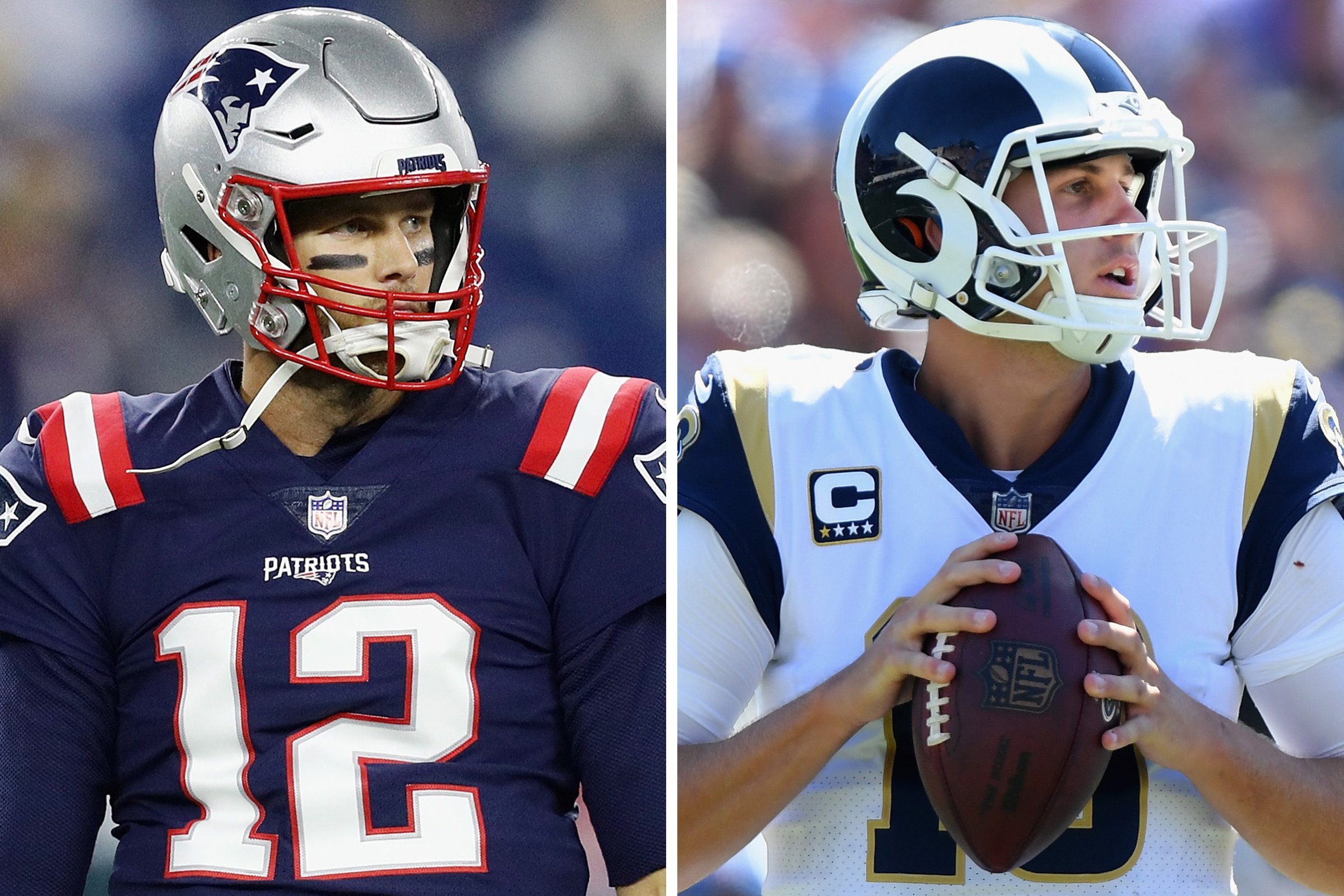
Tom Brady is making his ninth Super Bowl appearance on Sun., Feb. 3, when his New England Patriots take on the Los Angeles Rams. So he kinda knows the drill: how to cope with the hype in the lead-up to the game, the extra ticket requests from newfound “friends,” the additional media obligations, the overall glare of a sporting spectacle. Los Angeles Rams quarterback Jared Goff, who’s making his first Super Bowl appearance, will have to learn to manage all these distractions on the fly. In Atlanta, site of Super Bowl LIII, you’ll find the starkest-ever experience gap — 9 years vs. 1 year — between the starting Super Bowl quarterbacks.
History tells us, however, that when a Super Bowl newbie quarterback goes up against an old Super Bowl hand, his team essentially has a 50-50 shot of winning. In the first 52 (or should we say LII?) Super Bowls, a quarterback making his first Super Bowl appearance has matched up against a quarterback with prior Super Bowl experience 24 times, or in 46% of the games. And in those 24 matchups, the Super Bowl rookies have won 11 of them — as close as you can get to half, without actually being exactly half.
Surprisingly, newbies have fared better against veterans in recent years. Intuitively, you’d figure that as the Super Bowl grows in stature and spectacle each year, the quarterbacks making their first appearances would be more likely to feel overwhelmed by the moment. But veterans had their best string of success at the dawn of the Super Bowl era, in the days prior to 24-7-365 sports coverage.
The first four times a Super Bowl veteran faced a Super Bowl rookie, the veteran won, starting in Super Bowl II, when Green Bay’s Bart Starr won a second straight title for the Packers, who beat the Oakland Raiders, and QB Daryle Lamonica, at the Orange Bowl in Miami. Back then, the name “Super Bowl” didn’t even appear on the game tickets: rather, the ticket read “World Championship Game: AFL vs. NFL.” The words “Super Bowl” wouldn’t appear until two years later, in Super Bowl IV; Kansas City quarterback Len Dawson, who lost in Super Bowl I, defeated the Minnesota Vikings, whose Joe Kapp was making his first (and last) appearance in the big game. Then, after losing Super Bowl VI to Roger Staubach, Miami’s Bob Griese won back-to-back championships against a pair of newbie QBs: Billy Kilmer of Washington and Fran Tarkenton of the Minnesota Vikings.
Terry Bradshaw ended the veteran winning steak in the next year, in Super Bowl IX, in January 1975. His Steelers beat the Vikings, 16-6. Tarkenton would go 0-3 in the Super Bowl, while Bradshaw went 4-0; he’d beat another Super Bowl rookie, Vince Ferragamo of the Los Angeles Rams, in Super Bowl XIV. (Goff will join Ferragamo as the lone LA Rams quarterbacks to reach a Super Bowl. The franchise made two appearances with Kurt Warner under center, but the Rams then belonged to St. Louis.)
Since 2008, five Super Bowl newbies have defeated veterans, starting with Eli Manning and the New York Giants upsetting the Brady and the Patriots, who were shooting for a historic 19-0 season, in Super Bowl XLII. And maybe Goff can draw some inspiration from last year. The prior record for the Super Bowl experience gap was Super Bowl LII, a year ago, when Brady, making his eighth appearance, faced Philadelphia’s Nick Foles, who was also making his first. The Eagles won 41-33. Foles won the Super Bowl MVP.
More Must-Reads From TIME
- The 100 Most Influential People of 2024
- The Revolution of Yulia Navalnaya
- 6 Compliments That Land Every Time
- Stop Looking for Your Forever Home
- If You're Dating Right Now , You're Brave: Column
- The AI That Could Heal a Divided Internet
- Fallout Is a Brilliant Model for the Future of Video Game Adaptations
- Want Weekly Recs on What to Watch, Read, and More? Sign Up for Worth Your Time
Write to Sean Gregory at sean.gregory@time.com and Chris Wilson at chris.wilson@time.com